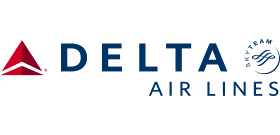 Delta just scheduled its much anticipated triangle route to South Africa
Delta just scheduled its much anticipated triangle route to South Africa
This post contains references to products from one or more of our advertisers. We may receive compensation when you click on links to those products. Terms apply to the offers listed on this page. For an explanation of our Advertising Policy, visit this page.
It may have taken over two years, but Delta is finally gearing up to launch its triangle route within South Africa.
The Atlanta-based carrier filed plans over the weekend to commence service from Atlanta to Johannesburg to Cape Town.
This so-called triangle route will operate four times a week beginning on Dec. 2, as first seen in Cirium schedules and later confirmed to TPG by airline spokesperson Drake Castaneda.
The service will operate on Tuesdays, Wednesdays, Fridays and Sundays through March 25, 2023 (at the earliest).
Delta will deploy its flagship Airbus A350 on the route, which features 32 private Delta One Suites, 48 Premium Select recliners, 36 extra-legroom Comfort+ seats and 190 standard main cabin seats. Before the pandemic, the carrier flew between Atlanta and Johannesburg with a daily nonstop operated by the Boeing 777-200.
Within weeks of the pandemic shutting down the travel industry, Delta made the decision to retire its 777 fleet in May 2020. The airline also suspended service to South Africa due to border closures.
As travel restrictions eased, Delta decided that it would resume serving South Africa, but with a new strategy largely dictated by aircraft performance.
Without the 777, the Airbus A350 became the airline’s largest and flagship aircraft.
The problem was that the A350 didn’t appear to have the range to serve the Johannesburg to Atlanta leg. The city’s O.R. Tambo International Airport sits at 5,558 feet — over a mile above sea level.
This high elevation degrades the takeoff performance of the aircraft, meaning that the plane can’t take off with as much fuel or payload as it would at sea level.
So, Delta got creative.
It would tack on a short flight from Johannesburg to Cape Town, and then send the jet back to its Atlanta mega-hub from the coastal Cape Town International Airport that sits just 151 feet above sea level. This way, the airline could maximize fuel and payload for the 8,130-mile nonstop.
Plus, the airline would begin serving Cape Town, a popular leisure destination for American tourists. Travelers headed to Johannesburg or Cape Town could enjoy nonstop service in one direction, with a short refueling stop in the other. (The airline was planning to operate the short Johannesburg to Cape Town flight as a so-called eighth-freedom route, meaning that domestic flyers couldn’t just take the Delta flight between the two largest cities in South Africa.)
While the plan looked good on paper, Delta ran into considerable headwinds for its proposed triangle route. Aside from multiple delays due to a resurgence in COVID cases and travel restrictions, the carrier couldn’t get permission from the South African government to operate the triangle route.
But, that all changed earlier this year when Delta finally received permission to go forward with this triangle route.
However, it didn’t immediately commence service. Instead, Delta applied for permission from the U.S. Department of Transportation to operate a nonstop flight from Atlanta to Cape Town — without the refueling stop in Johannesburg.
The U.S. and South Africa do not share an “open-skies” agreement, and flight frequencies are regulated by local aviation authorities.
Delta ‘s application competed against United’s proposed new nonstop from Washington Dulles to Cape Town.
With both airlines vying for the four remaining weekly frequencies under the bilateral air service agreement with South Africa, things got heated until the DOT came back in July with a surprise: it had secured additional slots from the South African authorities that would allow both Delta and United to move forward with their nonstops to Cape Town.
